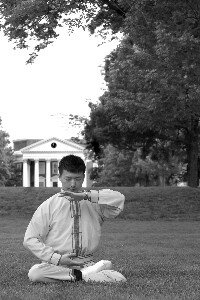FACETIME- Li's battle: Practitioner wants freedom for Falun Gong
When passersby spot the exercises and meditation by Xidong "Joshua" Li on the UVA Lawn, they might assume he's practicing T'ai Chi. But in fact, Li and a small group who meet for this Saturday mornings routine are practitioners of Falun Dafa. Better known as Falun Gong, this spiritual movement that has been suppressed by the Chinese government since 1999– the same year Li arrived in Charlottesville for a post-doc in orthopedic surgery.
Anyone who followed Chinese president Hu Jintao's mid-April visit to the United States saw 47-year-old Falun Gong follower Wenyi Wang confront Jintao to demand that he stop persecuting the Falun Gong. She was escorted from the White House press area by secret service and faces charges of "intimidating a foreign official."
By contrast, Charlottesville's City Council practically rolled out a red carpet. Proclaiming December 24-30, 2000 "Falun Dafa Week" Council encouraged Charlottesvillians to "find out more about the benefits" of the practice.
"There were a whole bunch of them walking through town," recalls Blake Caravati, who as mayor back then signed the proclamation. But Caravati says he never engaged in the practice. "They wrote to us a few weeks before," he says, "and asked us to meet them in front of City Hall."
Li says he was pleased with Charlottesville's acceptance of the movement, since in western media Falun Gong is often portrayed as a formal religious movement akin to a cult. But Li says that description is inaccurate.
"It's very flexible," he explains. "There's no headquarters or formal organization."
Falun Gong practitioners engage in a series of gentle movements. But Falun Gong goes further than Yoga or T'ai Chi, which "don't have a lot of teaching about morality," Li says, adding that Falun Gong stresses truthfulness, compassion, and tolerance. He acknowledges that homosexuality is discouraged as unhealthy for its practitioners, but says it's not prohibited or judged.
"There's no rule saying you should not," he says. "It's based on personal understanding."
The movement also encourages belief in multiple gods. For instance, Jesus, Mary, and Buddha are all seen as gods in Falun Gong.
Li, 33, became a follower nine years ago in China after his mother, who'd been very sick, discovered the movement.
"The health benefit is amazing," he says. But despite the positive health benefits, Li– who currently does medical research at UVA but isn't certified to perform surgery in the U.S.– says the Chinese government's suppression terrifies him.
He and other practitioners claim the government jails and executes Falun Gong followers as "political enemies," then harvests their organs. Although the U.S. State Department has found no evidence to validate those claims, Li says he worries for his family and says he cannot go home because he believes he is on a government "black list."
Li says he is following the case White House protester Wang, who– faces up to six months in jail– has a hearing is scheduled for May 18. He also hopes the Chinese government will relax its suppression so that he can go home to be with his family.
"I want to be an orthopedic surgeon," he says.

Xidong "Joshua" Li
PHOTO BY JEN FARIELLO
#